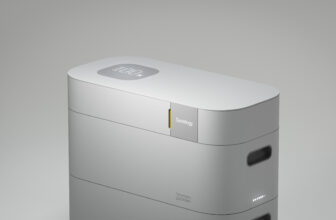Power stations, or portable energy stations, have become an essential element in the design of the autonomous and modern home. With the evolution of technologies and the growing awareness of the need for sustainable energy solutions, these devices offer a reliable and ecological source of energy. They not only reduce dependence on traditional electricity networks, but also ensure a constant supply of energy, essential in our increasingly connected daily lives. One of the key elements on which this technological advance is based is the use of rechargeable lithium-ion batteries.
“PowerStations” and their batteries: an introduction to the autonomous home
Also known as portable electric generators, PowerStations have become very popular in recent times. Initially, these devices were designed for people on the move and users independent of any network. They have now found their place in our homes due to the increasing cost of electricity and the risk of power cuts in certain areas. They not only help to cope with grid outages, but also to store electricity at low cost, or even for free, thanks to solar energy. However, it is essential to understand the technology of the batteries used in these PowerStations in order to fully exploit their potential and benefit from all their advantages.
The most used batteries in autonomous housing
Lead-acid batteries are based on well-established technology and have proven themselves over many decades. Theseare made up of lead plates immersed in a sulfuric acid electrolyte. One of their main advantages is their relatively low cost. They are therefore suitable for users with a limited budget. These batteriesare available in different sizes to meet a wide variety of needs. However, the latter have also revealed major drawbacks. They are heavy and have a shorter lifespan, ranging from 500 to 1,200 cycles on average, compared to batteries using other technologies. In addition, their performance is poor in the event of heavy discharges, which limits their use in certain circumstances. Lithium-ion batteries
, for their part, are increasingly in demand in various fields, whether for industrial, professional or household use. They are used to power large handling equipment as well as to store energy via photovoltaic panels. PowerStationsalso benefit from these many advantages. Their operation is based on a chemical reaction between lithium and other materials. Their greatest assets are their lightness, high energy density, relatively long service life and excellent performance in the event of a deep discharge. These batteries are versatile and have compatibility for multiple uses. Their main disadvantage, however, is that they are initially more expensive than lead-acid batteries. In addition, they present a risk of overheating or fire if not used correctly. In general, their capacity decreases over time.
The modern home and rechargeable lithium-ion batteries
Many electronic and computer devices are used by the modern home to simplify domestic tasks, with the help of home automation systems. Rechargeable lithium-ion batteries can play an important role in this technological revolution.
Here are the main features of these devices:
Uninterruptible power supply:
- PowerStations equipped with lithium-ion batteries ensure an uninterrupted power supply in a home. This means that home automation devices, such as surveillance systems, smart thermostats and automated lighting, remain operational even in the event of a power outage. This ensures the safety and comfort of the occupants of the home. Solar energy storage:Solar energy is increasingly common in modern homes. Solar panels capture energy and store it in rechargeable lithium-ion batteries.
- The stored energy can then be used to power electrical devices, reducing dependence on grid electricity. PowerStations also offer intelligent energy management,maximising the use of solar to minimise grid electricity costs . Mobility and flexibility: Modern electrical systems are not limited to homes. They are also used for recreational vehicles, boats and other mobile applications. Lithium-ion batteries offer the advantages of weight and size to be able to perfectly power these types of systems, and thus guaranteeincreased mobility
- and maximum flexibility . So whether you are at home or on the move, modern comfort follows you everywhere.Sustainability and economy: Lithium-ion batteries are known for their considerable longevity. This makes them economical, as they do not need to be replaced frequently. In addition, thanks to their high energy storage capacity, they are able to meet the energy needs of even the most demanding devices. This contributes to a more sustainable and energy-efficient use. In short, rechargeable lithium-ion batteries are now playing a crucial role in the development of modern, autonomous homes. As this technology continues to evolve, lithium-ion batteries will continue to play a central role in improving our homes and our lifestyles.






Please remain courteous: a hello and a thank you cost nothing! We're here to exchange ideas in a constructive way. Trolls will be deleted.